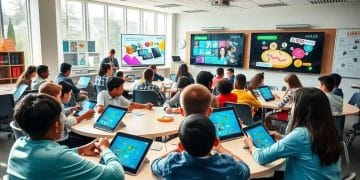Career readiness programs trends shaping the future

Career readiness programs trends focus on integrating technology and soft skills to equip students for the workforce, ensuring they are prepared for the demands of modern jobs.
Career readiness programs trends are transforming how students prepare for the workforce. With evolving job demands, understanding these trends can help you navigate your career path more effectively.
Current trends in career readiness programs
Understanding the current trends in career readiness programs is crucial for students and educators alike. These trends reflect the changing landscape of the job market and the skills needed for future success.
Focus on Soft Skills
Employers today are increasingly valuing soft skills, such as communication, teamwork, and problem-solving abilities. Career readiness programs are adapting to this by integrating soft skills training into their curriculum. For instance, role-playing exercises and group projects provide students with opportunities to develop these essential abilities in a practical setting.
Incorporation of Technology
Technology plays a significant role in shaping career readiness programs. Online platforms and digital tools are becoming focal points for instruction. Students learn how to use technology effectively, making them more adaptable in various work environments. Moreover, virtual internships and remote learning projects offer real-world exposure that is crucial for today’s workforce.
Partnerships with Industry
Building partnerships with local businesses and industry organizations is another trend. These collaborations enable students to gain insights into the real-world applications of their training. Industry professionals can provide valuable mentorship, and students can participate in internships that prepare them for future employment opportunities.
Importance of Personal Branding
Today’s job seekers need to understand the importance of personal branding. This includes developing a strong online presence and knowing how to market oneself effectively. Career readiness programs often include workshops on resume writing, LinkedIn profiles, and interview techniques, empowering students to showcase their skills.
As we explore these *current trends* in career readiness programs further, it becomes clear that adapting to the evolving job market is essential. Programs that emphasize soft skills, leverage technology, foster industry partnerships, and encourage personal branding will prepare students for successful careers.
Importance of soft skills in today’s job market

The importance of soft skills in today’s job market cannot be overstated. While technical skills are vital, employers increasingly seek candidates who excel in areas like communication and collaboration.
What are Soft Skills?
Soft skills encompass interpersonal skills that help individuals work effectively with others. These include abilities such as empathy, adaptability, and conflict resolution. They enhance teamwork and help build a positive workplace culture.
Why Employers Value Soft Skills
Many employers prioritize soft skills because they directly impact a company’s success. A candidate who communicates well can share ideas clearly and understand feedback. This skill is essential in preventing misunderstandings and fostering teamwork.
- Improves teamwork: Soft skills help individuals work harmoniously and improve the overall productivity of a group.
- Enhances customer relations: Employees with strong interpersonal skills can create better connections with clients and customers.
- Adaptability: In fast-changing industries, those who are adaptable can handle new challenges more effectively.
- Builds a positive work environment: Soft skills contribute to a supportive and inclusive workplace.
As organizations focus on remote work and collaborations across digital platforms, the demand for soft skills is growing. Professionals who possess strong communication skills can connect with colleagues and clients effectively, regardless of their location.
Furthermore, soft skills can often make a difference in job promotions and career advancements. Leaders who communicate well tend to inspire and motivate their teams, demonstrating the value of these skills in leadership roles.
In the context of career readiness programs, teaching students about the significance of soft skills is crucial. Programs that integrate soft skills training prepare future professionals to succeed in their careers.
Integrating technology in career readiness
Integrating technology in career readiness is essential in today’s fast-paced world. As technology changes how we work, educating students on its use prepares them for modern careers.
Role of Technology in Learning
Incorporating technology into career readiness programs enhances the learning experience. Tools like online simulations and interactive software allow students to practice essential skills in a safe environment. This hands-on approach builds confidence as they prepare for real-world situations.
Virtual Internships and Experiences
Virtual internships are becoming increasingly popular. Students can gain valuable experience without leaving their homes. These opportunities allow them to explore industries and connect with mentors across the globe.
- Flexible learning: Students can access materials anytime and from anywhere.
- Interactive platforms: Engagement increases through gamified learning and virtual collaborations.
- Networking: Digital platforms allow students to connect with industry professionals.
- Skill development: Technology equips students with vital skills, including digital literacy and remote collaboration.
Moreover, integrating tools like video conferencing prepares students for remote work. They learn to communicate effectively, build relationships, and collaborate with others without face-to-face interaction.
Career readiness programs that leverage technology also encourage creativity and innovation. By utilizing design software or project management tools, students can bring their ideas to life in a professional context.
The benefits of this integration are clear. As education evolves, the incorporation of technology will be essential for producing the next generation of skilled workers.
Measuring success in career readiness initiatives

Measuring success in career readiness initiatives is vital for understanding their impact on students’ futures. Determining what works helps educators improve programs and prepare students effectively.
Key Performance Indicators (KPIs)
To measure success, schools and organizations can establish key performance indicators (KPIs). These metrics offer insights into whether students meet their career preparation goals. Key areas to consider include:
- Job Placement Rates: The percentage of students who secure employment after completing the program.
- Internship Participation: Tracking how many students engage in internships can highlight the program’s effectiveness.
- Employer Feedback: Surveys or evaluations from employers can reveal how well-prepared students are for the workforce.
- Skill Assessments: Regular assessments to measure the growth of both technical and soft skills among students.
Collecting data on these KPIs can provide a clearer picture of a program’s success. Regular reviews allow educators to adjust and improve offerings to meet changing job market demands.
Long-Term Outcomes
In addition to immediate metrics, assessing long-term career outcomes is crucial. This includes tracking alumni to see how many remain in their field after several years or whether they achieve higher salaries. Analyzing these results offers deeper insight into the lasting impact of career readiness initiatives.
Stakeholder engagement also plays an important role in measuring success. By involving students, educators, employers, and the community in feedback processes, programs can be continually refined and improved. Regular stakeholder meetings can ensure everyone’s perspectives are considered, leading to a more holistic understanding of success.
Ultimately, a successful career readiness initiative should not only help students secure a job but also prepare them for lifelong learning and adaptability in their careers.
FAQ – Frequently Asked Questions about Career Readiness Programs
What are career readiness programs?
Career readiness programs are designed to equip students with the necessary skills and experiences to succeed in the workforce.
Why are soft skills important in these programs?
Soft skills, such as communication and teamwork, are crucial because they prepare students to interact effectively in professional environments.
How does technology enhance career readiness initiatives?
Technology enhances these initiatives by providing interactive learning experiences, virtual internships, and access to online resources.
What metrics are used to measure the success of these programs?
Success is typically measured through job placement rates, internship participation, employer feedback, and skill assessments.





